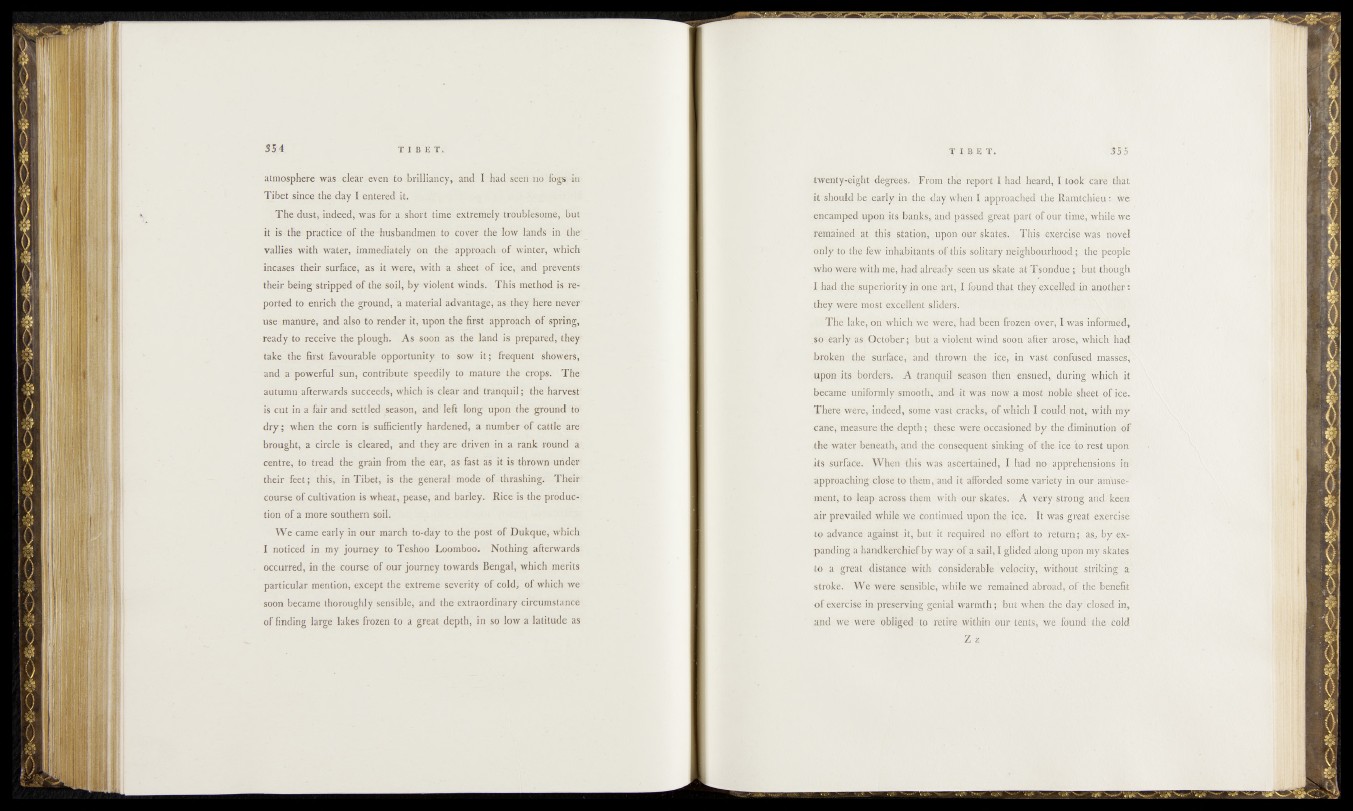
atmosphere was clear even to brilliancy, and I had seed no fogs.-in
Tibet since the day I entered it.
The dust, indeed, was for a. short time extremely troublesome,. But
it is the'practicerlbfr the husbandmen to cover the low lands in the;
vallies with water, immediately on the approach of winter, which'
incases their surface, as it were, with a sheet of ice, and prevents'
their being’stripped of the soil, by violent winds. This method is-reported
to enrich the ground, k material advantage, as they here never'
use manure, and also to render it, upon the first approach of spring,
ready to receive the plough. As soon as the land is prepared, they
take the first favourable opportunity to sow it; frequent shower^,
and a powerful sun, contribute speedily to mature the crops. The
autumn afterwards succeeds, which is clear and tranquil; the harvest'
is cut in a fair and settled season, and left long upon the grotmd td;
dry; when the com is sufficiently hardened, a number of cattle are
brought, a circle is cleared, and they are driven in a rank Wund- a'
centre, to tread the grain from the ear, as fast as it is thrown under
their feet; this, in Tibet, is the general mode of thrashing. Their"
course of cultivation is wheat, pease, and barley. Rice is the produc- i
tion of a more southern soil.
We came early in our march to-day to the post of Dukque, which
I noticed in my journey to Teshoo Loomboo. Nothing afterwards
occurred, in the course of our journey towards Bengal, which merits
particular mention, except the extreme severity of cold; of which we
soon became thoroughly sensible, and the extraordinary circumstance
of finding large lakes frozen to a great depth, in so low a latitude as
twenty-eight degrees. From’the report I had heard, I took ckr& that
jt should' be^qarlyin the »day. ysf^un11 appra^b^J^the Ramtchieu: "fee
©qcamped upon its banks* and passed gjeat pa#t qfpur time, .while we
remained at this station,1, uppn ouf skates,,* This: exercise-was,- novel
only to the few inhphhMhfc'Ali'tMs‘solitary npighbuurfeQpd; the people
who were with me, hadnlready seenng skate ajtX^ojndUet Ixu though
1 had the-superiority in' one art, I found that they qjccelled!i»\aoQther:
.they were most excellent sliders.
The lake, on which we vSrere, hadbeeh frozen omry1 was infonuBS;
.§0 early as> October; but a violent wind soon after, hW
broken the' surface, sand’ thrown the ice, in ^asi cohfflsed-
upon its borders.. A tranquil iSea'aqn. ^jfgn'.ghSjJad,' duriftgv which lit’
became uniformly-smooth, and it w^s now » most: noble, sheet; of tfiS-
There Were, indeed, spine vas't cracksy qf;Which I could.tiQt,
cane; measure the depth; these wes^Qee&sj'Qhgd’ib’y. (^.diminution ,of
the water beie^hr.^d ite consequent sinking of upon
its surface. When this was ascertained, I had. no .apprehensions in
appruaching ;clqse to them, and it afforded some variety idpqj^njuser*
meat, to leap across them with our skates. A very strong and keen
air prevailed while we continued upon ipi ice. ' It was great exercise
to advance against it, but it required no effort to return; as, by1 expanding
a handkerchief by way of a sail, I glided along upbivmy skates
to a great distance with considerable velocity, without striking a
stroke. We were sensible, while we remained abroad, of the benefit
of exercise in preserving genial warmth; but when the day 'closed in,
and we were obliged' to retire within our tents, we found the cold
Z k
‘»JSSSjpj